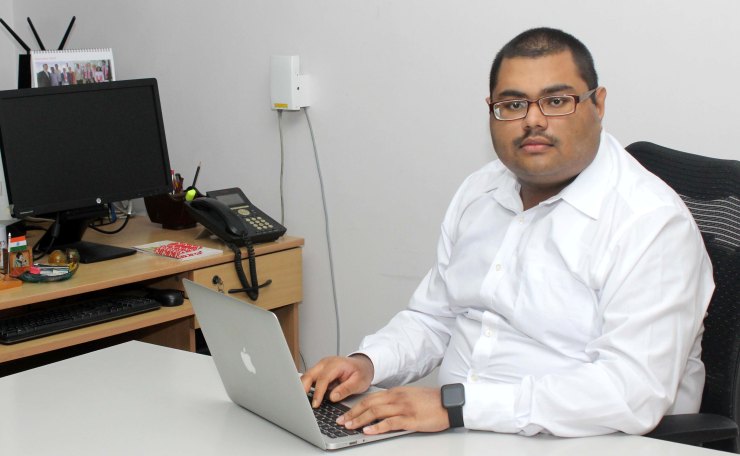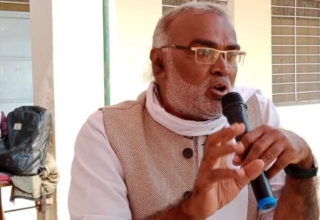
Guwahati-based Sunit Nandi, a Ph D scholar of IIT-Guwahati and a trainee teacher at NIT, Arunachal Pradesh, in all 27 years of age is also a budding technopreneur. His fascinating journey of life thus far is yet another testimony as to how much influence people & trends around you have on your choices in a middle class family. Even after having created a privacy-first email hosting service (letter.is) and running a profitable e-magazine (Techno FAQ), his priority is still finishing his Ph D. Nevertheless, his ventures have already made him a youth inspiration and potentially a ‘unicorn’ candidate of future. Autar Nehru spoke to him on his ongoing journey.
Your father, Prof Sukumar Nandi, who is a professor at IIT Guwahati, was the greatest influence on your childhood as far as the world of computers goes. Tell us, some fond memories and triggers that made computers fascinating to you so early?
I was first introduced to computers at the age of 3; in fact, my father used to take me to his workplace and allowed me to operate on the computer. I spent time on MS-DOS and Windows 95, typing random text on WordStar and drawing figures on MS Paint. As I got older, I got introduced to Windows 98 and Solaris and the world of the Internet and Microsoft Explorer. The fact that one could do so many activities on a computer always fascinated me. That was it, a positive distraction and nothing much.
However, one fine day, when I was some 13-years old, I came across Internet Relay Chat (IRC), where I discovered I could talk to random people around the world organized by topics in chatrooms. In one of the chatrooms, one person told me I should try out Puppy Linux as a lightweight alternative to Windows XP. I downloaded the Puppy Linux ISO file from the Internet, burned a CD and then booted into it, and I was instantly hooked to see how different it was compared to what I was using. It was my first view into the world of GNU/Linux. Puppy Linux was smooth, didn’t lag/stutter like Windows and was infinitely customizable. This spurred my interest in operating systems and networking and in general in computers.
And it decided the future course of your life almost?
Yes, as memory of the incident that opened me up to a career in Computer Science, I run a service called Techno FAQ ZNC (https://znc.technofaq.org/) which allows IRC users to have a permanent presence on the IRC networks of their choice and preserve their conversations, even if they do not have continuous connectivity to the Internet.
It seems Internet and communications technology and the changes it brought in the decade you were growing too influenced your thought process?
When, I was about 6 years of age, my father wanted to demonstrate to my mother and me the Internet and how to use it. He got a dial-up modem which was connected by a serial port to our home PC. He also brought with him a SatyamOnline CD. On our computer running Windows 2000, he popped in the CD into the optical drive, installed the dialer software, connected the phone line to the modem and started the connection. After a few high pitched tones and scratching noises, the computer was connected to the Internet with 48 kbps speeds on a 56 kbps connection. He then went on to show us how we could search on Google, send email with Hotmail, play Flash/Java games, and chat with people on Yahoo! Messenger. Once the Internet became a daily part of our lives, my father replaced SatyamOnline with Tata Indicom dial-up Internet as it was more cost effective. Those were some good days.
Despite, your obvious inclination to computer sciences you took biology as subject in class XI. What was the thought behind it?
“A human being should be able to change a diaper, plan an invasion, butcher a hog, conn a ship, design a building, write a sonnet, balance accounts, build a wall, set a bone, comfort the dying, take orders, give orders, cooperate, act alone, solve equations, analyse a new problem, pitch manure, program a computer, cook a tasty meal, fight efficiently, die gallantly. Specialization is for insects.”
— Robert Heinlein, Time Enough for Love
My elders often quoted this and it has always stuck to me. When I was getting admitted to class XI, bio-informatics and bio-electronics were hot and emerging fields at that point of time. I realised that it was better for me to take biology in order to not miss out opportunities on these interdisciplinary subjects. The other reason was that biology would never be taught again in any undergraduate CSE course, but programming would always be there even if I skipped it in HS.
Techno FAQ is your first venture that started in 2012. How did you conceive it and how it grew and how has been the journey so far?
True, My entrepreneurial journey started in 2012 when I launched an e-magazine named Techno FAQ (https://technofaq.org) that covers unconventional topics in science, technology, computing, business and education. I started it out of passion and not as a means of livelihood. I spent my time writing articles and finding topics to cover. That used to consume all of my free time back in my college days, to the point I was awake 20 out of the 24 hours of my day.
My hard work finally paid off. By 2014, I was getting advertisements and advertorial campaigns on the e-magazine from businesses that required sales and publicity. As the number of advertisers grew, I was able to generate more funds to research and write better content. In 2019, I acquired two more e-publications, Tekh Decoded (https://tekhdecoded.com, focusing on consumer electronics) and LinuxBin, now nixFAQ (https://nixfaq.org, focusing on Unix-family operating systems, their internals, apps, and hardware running Unix-family OSes). I also now have a team of 5 people (excluding me), some of whom look after the electronic publications, leaving me more time to focus on what I want to work on now, that is developing and running privacy-oriented services on the Internet for public use.
What kind of content is offered by your e-zine for students?
Engineering students would find content on our e-magazines extremely useful for their career, whether it is for general knowledge, or for development of their skills. Our content has the newest, state-of-the art information about technological happenings around the world with enough technical coverage. It is a good starting point to discover various aspects in engineering and choose the field that interests the student the most in their career.
Now let’s come to your communication suite, Letter.is, a start–up. Briefly tell us what is it?
I have often suffered due to the lack of business email solutions that properly implements the basics (such as email deliverability, contact sync, calendars, search, etc.) and also respects user privacy and right to their data. Email communication in today’s world is often treated as an afterthought even though online businesses have to depend on it the most. Major email providers not only mine user data but also use this data to display ads or sell to third parties. Some email providers do not allow you to import or export your email data, and some even lock you to their own apps. On the other hand, privacy-oriented email providers do not implement industry-standard email access protocols and also do not implement search functionality. I was so frustated with the state of email hosting that I self-hosted my own work emails for several years, and spent countless days improving the security of my setup and optimizing email deliverability. This year I felt that everyone should be able to experience the elegance of the setup I built and I decided to launch Letter with that goal. With this email offering business users should no longer need to sacrifice convenience for data privacy.
What are its advantages over free emails and its security protocols?
Letter is a privacy-first email hosting service which solves the problem of email communications being treated as an afterthought in a world where email is the backbone of everything. Letter is business friendly with advanced administrative control and features like spam aliases, outgoing/incoming TLS enforcement, filter rules, two factor authentication, time-based OTP, anti-virus scanning and not forgetting basic email monitoring. On Letter, every mailbox user’s email, contact and calendar data is separately encrypted using an EC-384 keypair generated for that specific user. The user’s password is the passphrase for the private key (i.e. the private key is encrypted with an AES-256 symmetric key derived from the user’s password). As a provider, without explicit knowledge of your password, Letter cannot read your data on disk. As a result, we operate with a better security level by default and the user has control of their data by design. You will not find it on any generic email provider.
But still, its user experience and features may not be appealing enough?
On the contrary, as of right now, Letter has more features and more fine-grained controls on its interface compared to any generic email hosting provided by big tech. Letter gives you all the features you need, without any vendor lock-in like proprietary access protocols and proprietary email apps and without any restrictions in importing and exporting your emails. Also, our spam filter uses multiple neural networks to classify spam with fewer false positives compared to solutions offered by big tech. Overall, the user experience should be much better than existing solutions.
In the future, we plan to add Instant Messaging, like WhatsApp and Telegram, based on XMPP (which is an open standard, unlike walled gardens like WhatsApp and Telegram) with end-to-end encryption by default as a part of our communication suite.
Do we see yourself as a kind of brand that will take over the world as a big Indian innovation and tech firm?
In the short term I plan to bootstrap Letter into a self-sustaining business, one that is not dependent on third parties or investors. I do not want to chase the cool factor of being the startup unicorn that raises and then burns money to acquire market share. Instead I wish to create a business that makes decent profit from the initial days and is able to provide consistent customer support as it scales and does not lose touch with its consumer base. It also makes great sense from a financial point of view because a privacy oriented business should not compromise its main goal of privacy in favour of investors.
In the long term, I plan to devolve/spin-off the business from Techno FAQ Digital Media to an entity of its own that provides easy-to-use privacy oriented services. That will include services other than email, such as managed hosting, on-demand VPNs and identity protection services. My plan is to create a business that is specifically catered to protecting privacy of people in the digital world. This kind of business has great scope in Asia because there isn’t any equivalent in this continent. The nearest competition is from European companies like Migadu, ProtonMail/ProtonVPN, Tutanota, etc.
Your theme of Ph.D. thesis, can we get a clue?
Unfortunately I am not able to provide any details about this because of Non-Disclosure Agreements. All I can tell you is that I am working on suicidal ideation and suicide detection from people on social media using the content they post.










